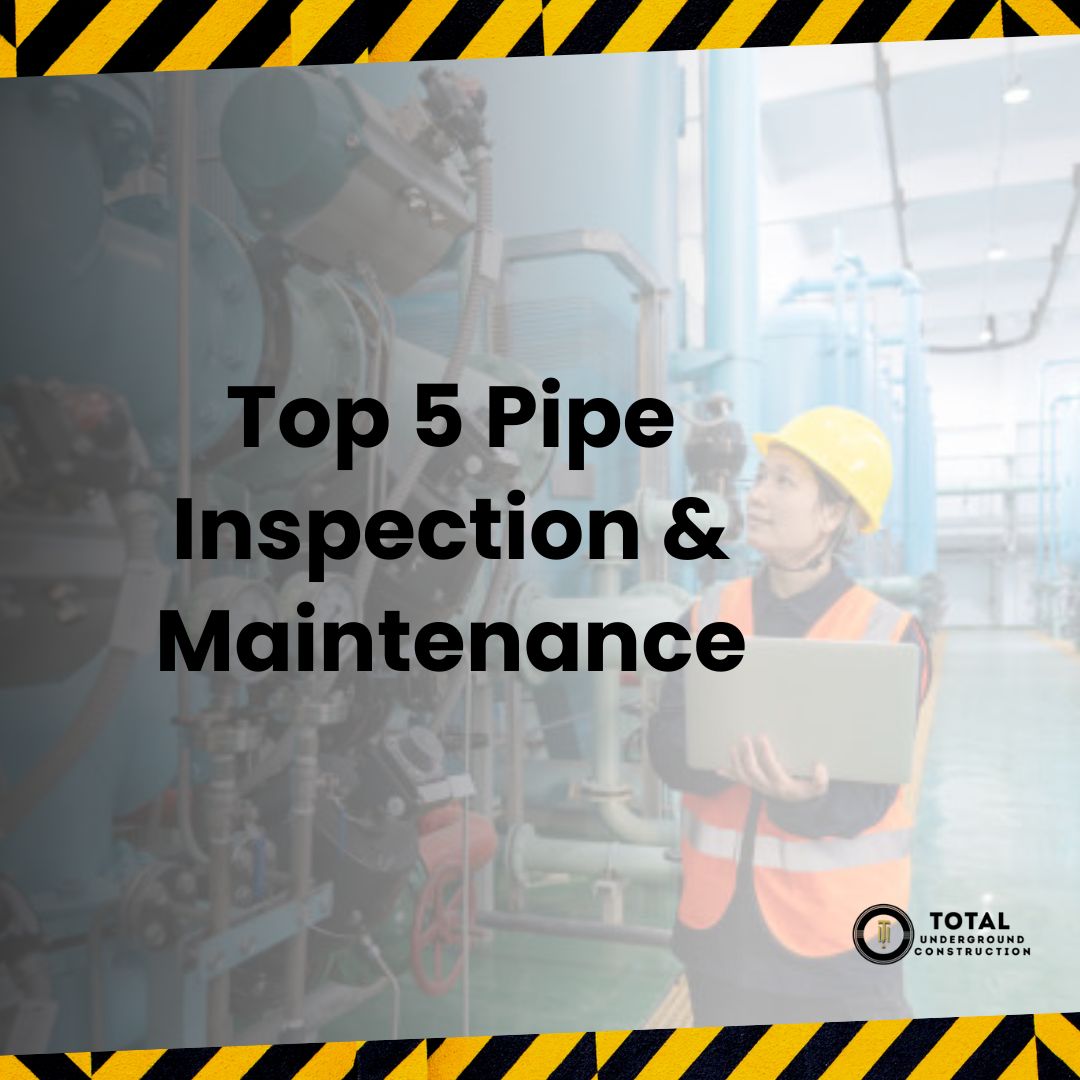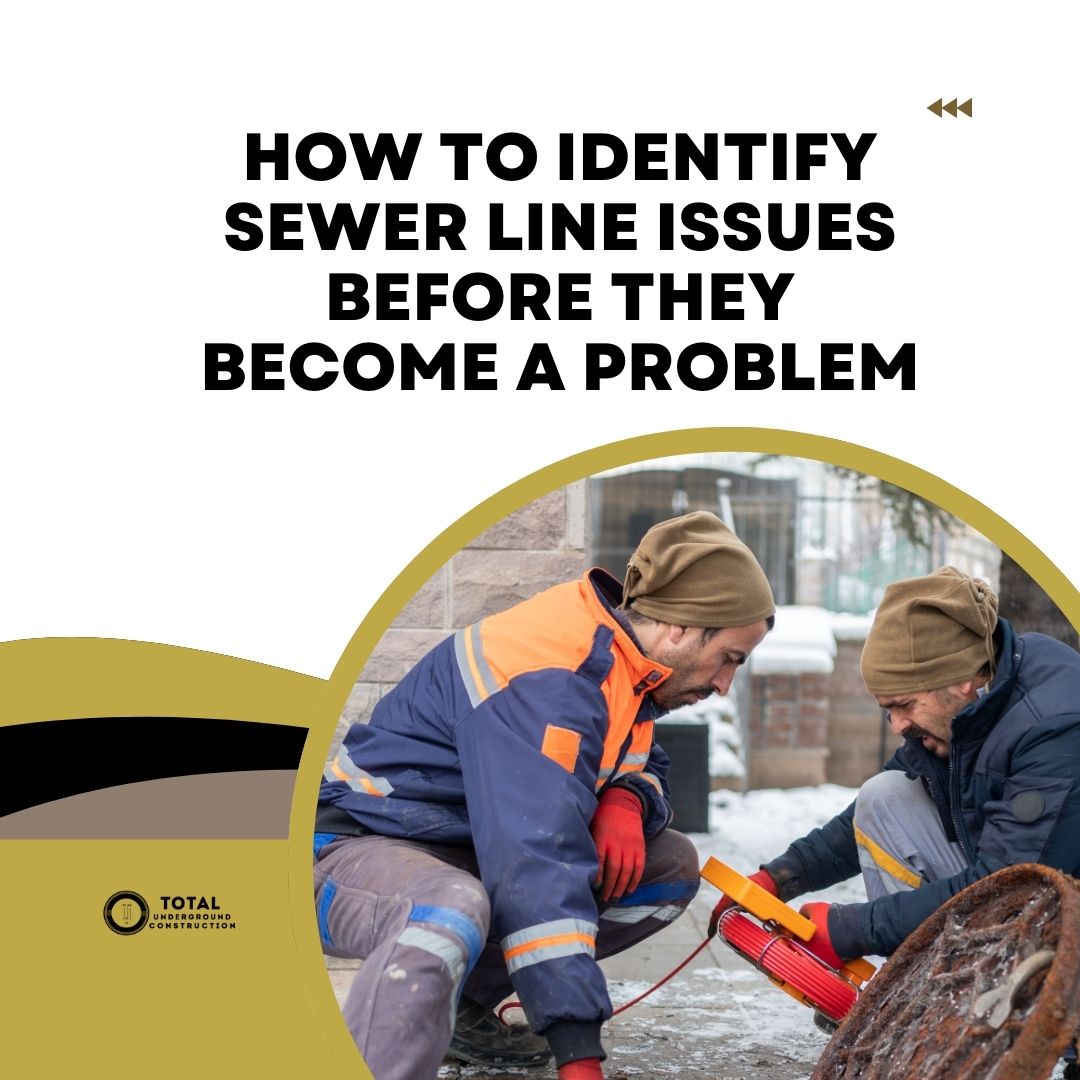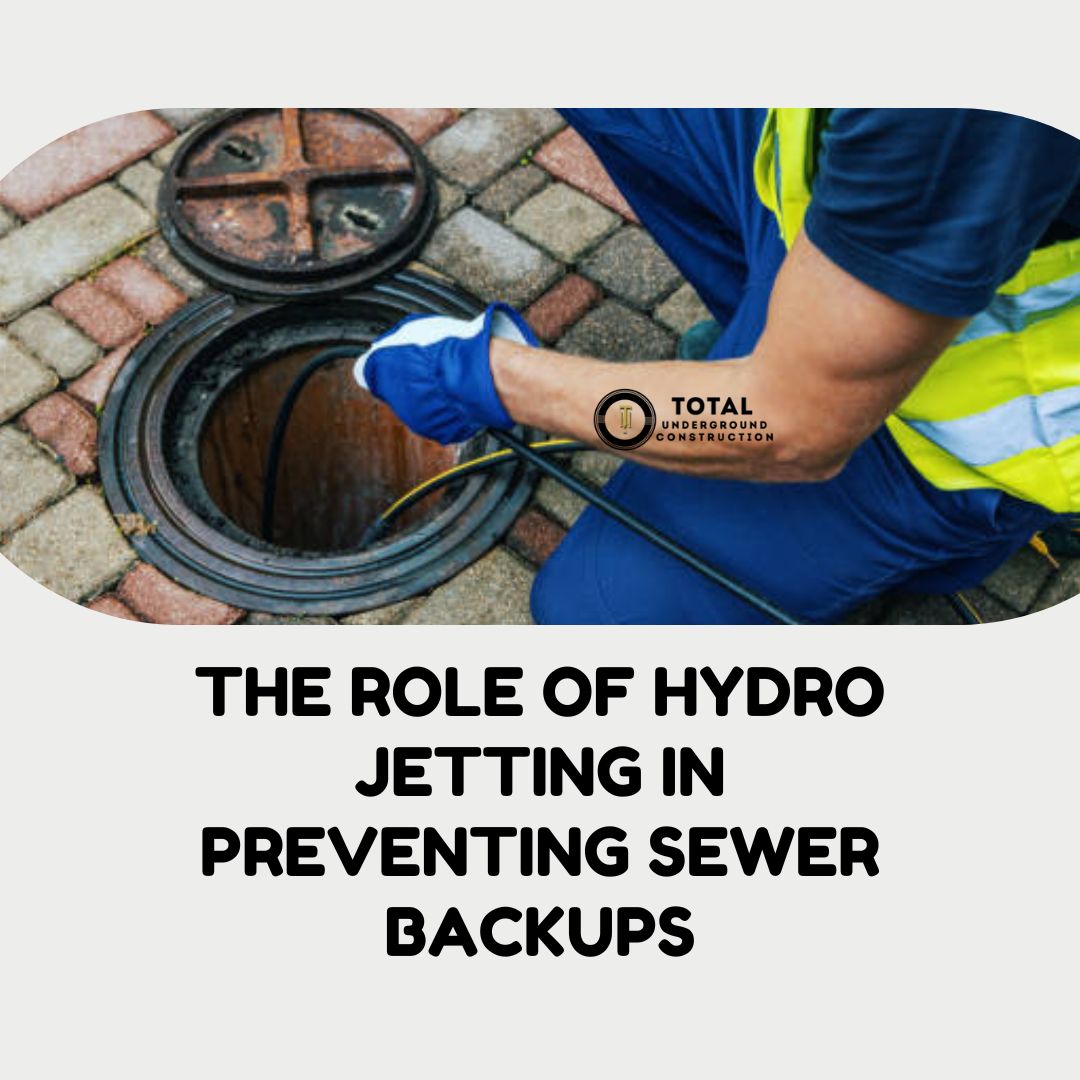Pipe leaks are among the major concerns property owners contend with regularly. Unsurprisingly, the Environmental Protection Authority reports that the US loses over 1 trillion gallons of water from leaks. Small underground leaks can cause extensive damage over time because they are challenging to find until it is too late.
Go to:
- Causes of Water Leak
- 10 Ways to Detect an Underground Pipe Leak
- Effects of Pipe Leaks
- Pipe Leak Repairs and Prevention
- Partner with Total UC for Professional Pipe Leak Detection and Repairs
Although most underground pipeline systems have a 70-year lifespan, many factors can quickly reduce this grace period. Topping the least is a leak. Here is a detailed explainer about pipe leaks, how they manifest, problems they cause, common signs of their existence, and ways to repair and prevent them in the future.
Let’s get started!
Causes of Water Leak
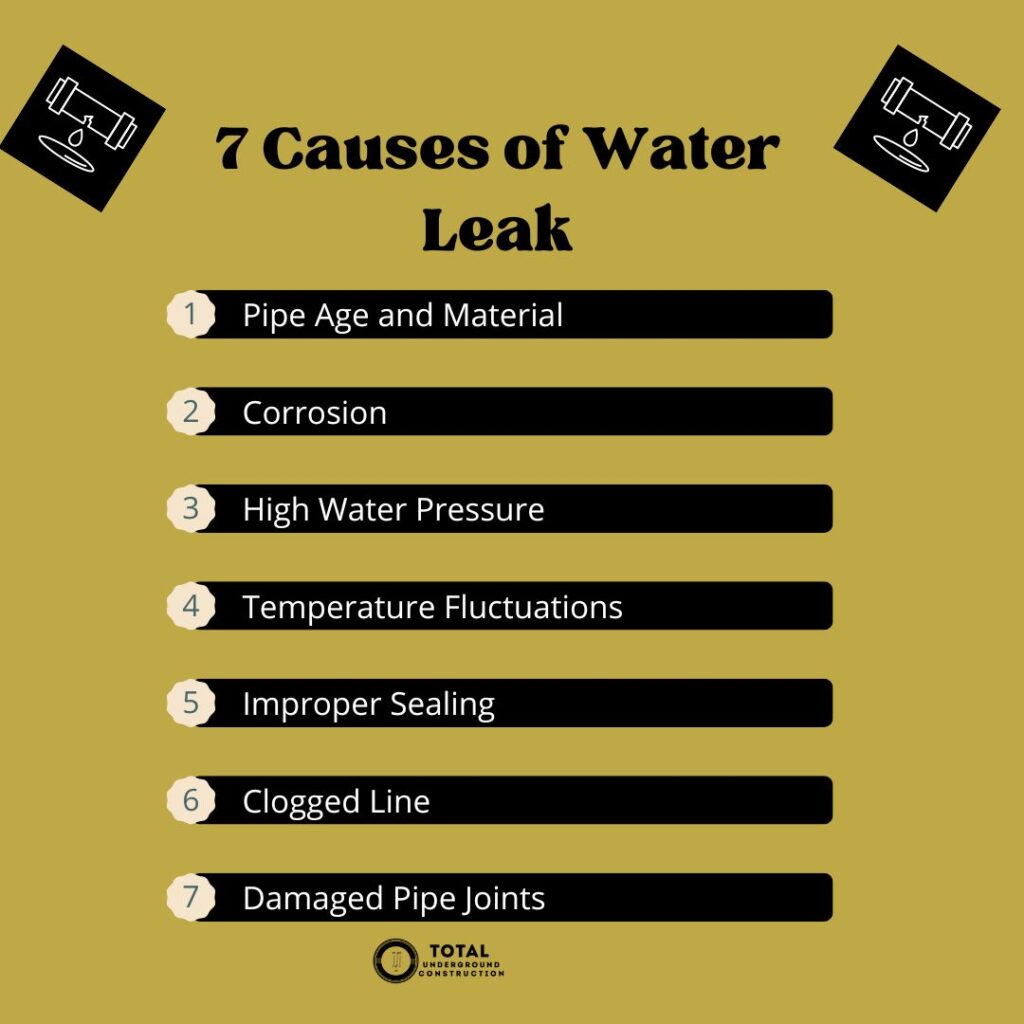
“It is the inconsequential leak that empties the biggest reservoir,” said Charles Comiskey. While the leak starts slowly, certain conditions interfere with the structural integrity of these sturdy pipes, causing breaches that lead to leaks. Let’s explore these factors.
1. Pipe Age and Material
If your property is old, there is a possibility it has aged pipelines. Old houses typically have cast iron, galvanized steel, or copper pipes, susceptible to brittleness and corrosion.
The rusted areas deteriorate over time, forming pitted holes that leak potable water, sewage, or drain water. The risk of corrosion increases if your water is acidic.
2. Corrosion
In addition to years of gradual decay, pipes can corrode from chemical reactions between the metal and water. The rust buildup eventually causes leaks. Metal pipes are the most susceptible to corrosion.
3. High Water Pressure
Excessive water pressure exerts undue pressure on conduits, joints, and fittings, weakening their structural integrity. Ideally, water pressure inside pipes should be between 30 to 80 psi. Anything above this threshold lowers your pipe’s lifespan.
4. Temperature Fluctuations
Frequent exposure to hot and cold temperatures affects your plumbing system due to constant expansion and contraction. Underground pipes expand and contract by absorbing heat or cold from the earth.
5. Improper Sealing
Pipeline system connectors can cause leaks without proper sealing during installation, replacement, or repairs. The best way to avoid this type of leakage is by hiring professional plumbers with licenses to provide plumbing services in your area.
Seals also wear off with time – this is particularly common at the point of connection with appliances. You will notice wet patches or condensation at such joints due to water leakage.
6. Clogged Lines
Blockages are rarely minor inconveniences. They mount pressure inside conduits, creating cracks, which can cause leaks and bursts. Dirt, minerals, and tree roots can clog potable water systems, increasing pressure from restricted water flow. In sewers and drains, debris, scum, organic substances, grease, and foreign objects can interfere with flow.
7. Damaged Pipe Joints
The most vulnerable point of any plumbing system is the joint. Joints can wear over time and leak out water or sewage. A weak joint deep within an underground system is not always easily identifiable, increasing the risk of causing significant damage.
10 Ways to Detect an Underground Pipe Leak
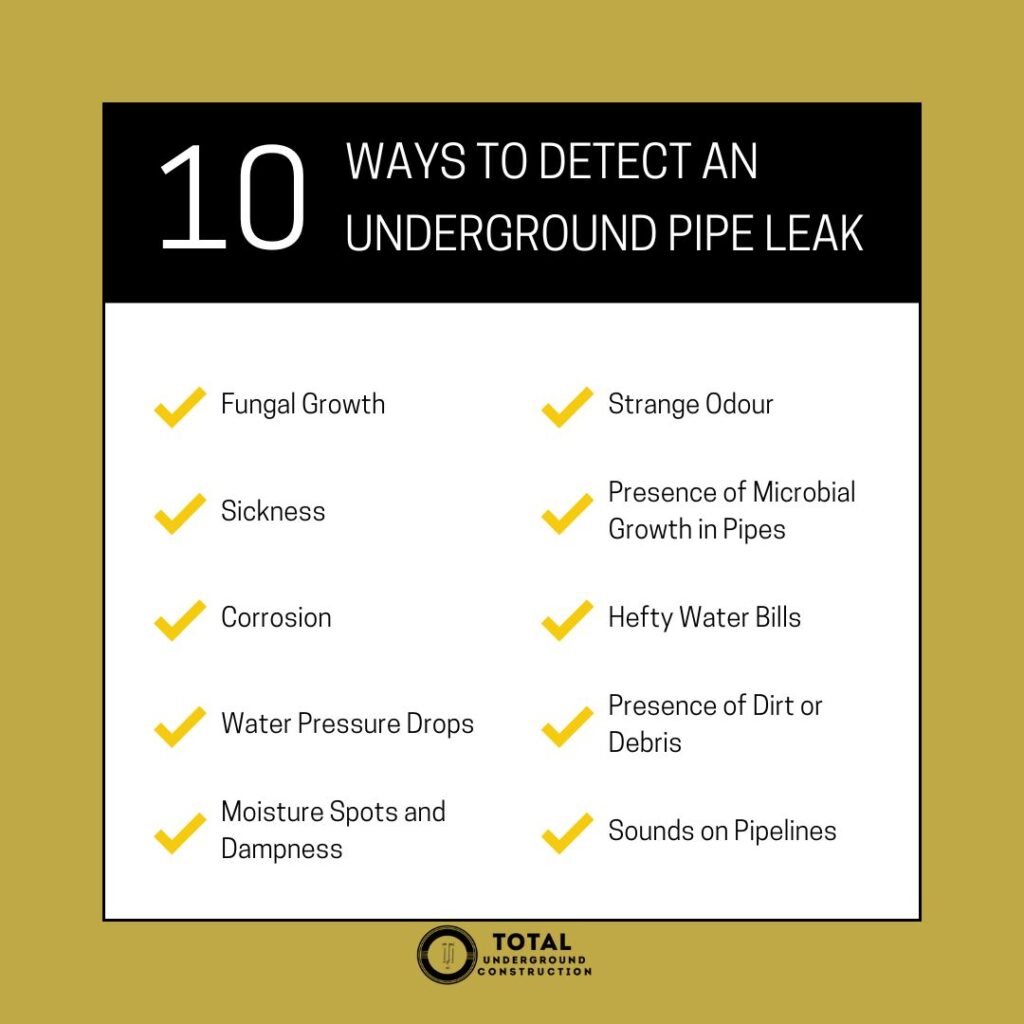
The best way to find underground leaks is through regular plumbing system maintenance. Professional plumbers perform minimally invasive inspections to assess pipeline conditions and issues that could create leaks. We use videos to capture the image inside your pipes. Noise frequency sensors pick up high-frequency sounds made by leaks.
Other leak detection techniques include thermal imaging to detect temperature variations underground. Underground leaks alter the local temperature of a pipe, making it easy to find hidden fissures in the plumbing system.
Plumbers also use moisture meters on dry walls and floors to assess the moisture content around pipelines. Ground-penetrating radar is effective in detecting underground leaks inside slubs.
But how can you underground find leaks? Here are some of the common signs of leaks.
1. Fungal Growth
Mold and mildew on floors, ceilings, and walls are a positive indicator of moisture in the surrounding area. They look like dark spots or white fur-like growth on the surface.
2. Strange Odor
Foul smells in drains and potable water systems indicate contamination from leaks or pipe breakage. You may also notice unpleasant smells in your yard or basement because of sewage leaks.
3. Sickness
This is not a pleasant method to detect water leaks on your property. Recurrent water-borne-related illnesses may occur because of drinking or using contaminated water from leaks.
4. Presence of Microbial Growth in Pipes
Blue-green growth inside your pipeline indicates the presence of microbes infiltrating your pipeline from fissures.
5. Corrosion
Rusty pipelines have a reddish color due to oxidation. The discoloration also transfers to the water, which appears reddish brown and smells like rust.
6. Hefty Water Bills
If your water bill is higher than normal, it could be caused by excessive water loss from leakages.
7. Water Pressure Drops
Leaks interfere with the pipes’ internal water pressure by redirecting water flow. The new route decreases the water volume flowing inside the pipe, reducing pressure in the system or causing backflow.
8. Presence of Dirt or Debris
The siphoning effect created by fissures attracts dirt and debris into the potable water system. The particles eventually find their way out of the faucet.
9. Moisture Spots and Dampness
Leaking water percolates on the surrounding surfaces, creating moisture spots. The water also causes dampness on concrete slabs.
10. Sounds in the Pipes
Pressure reduction from leaking pipes produces a hissing sound as the water flows. Drips from leaks also make a splash or rhythmic drop sound.
Effects of Underground Pipe Leaks
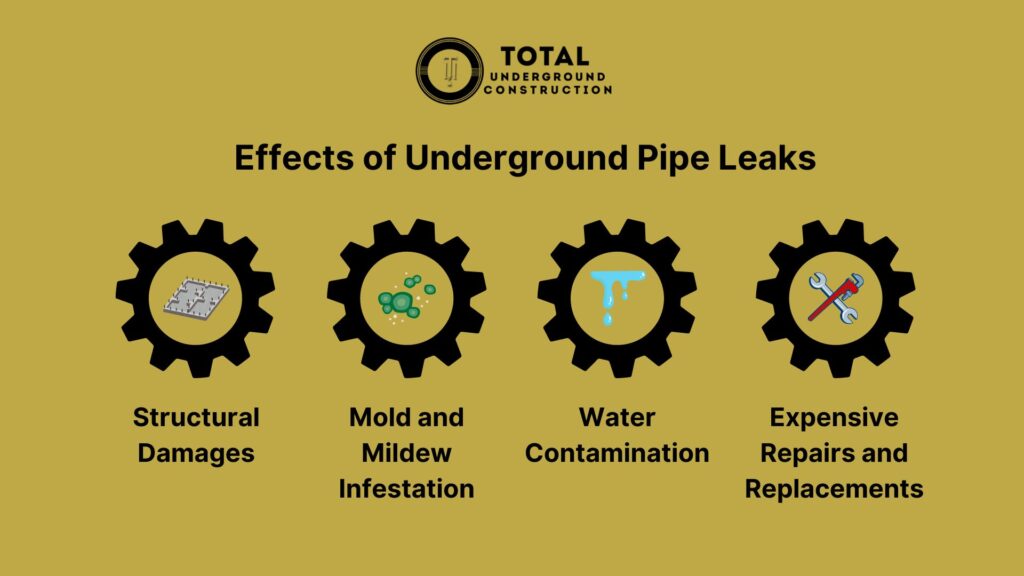
1. Structural Damages
Leaks create wet patches which accumulate over time, weakening the structural integrity of the surrounding area. It gradually destroys walls, floors, or the foundation of your property.
2. Mold and Mildew Infestation
The moist surfaces created by leaks provide ample moisture for bacteria and fungal growth. You will notice white, hairy substances or black dots all over your walls and floors. Mold and mildew spread spores around the home through the ventilation system, causing respiratory illness, headaches, eye and skin irritation, and allergies.
3. Water Contamination
The leakage is an entry point for dirt and microorganisms into your plumbing system. The leak creates a partial vacuum which acts like a siphon sucking contaminants at that point. Potable water infiltrated with impurities is a pathogen breeding ground. Contamination can also occur if a sewer line leaks wastewater into a potable pipe nearby.
Additionally, pressure drops inside potable water systems caused by leaks can increase contamination at cross-sections because of the siphoning effect. The cross-section of toilet and shower pipes has a high risk of contamination due to pressure drops.
4. Expensive Repairs and Replacements
Leaks cause costly damages from pipeline deterioration to rooting wood, microbial infestation, foundational issues, hefty water bills, and diseases. Most leaks are unidentifiable when the problems created are salvageable. They only become prominent after causing extensive damage, requiring whole pipeline replacements, new wall and floor installations, and heating and ventilation system cleanups.
Pipe Leak Repairs and Prevention
If you suspect a leak in your portable water system, shut off the main water supply to prevent further water damage. Use a bucket to contain drips. Call a professional plumber to assess the damage using proper technologies and equipment for comprehensive analysis and diagnosis.
Avoid DIY fixings because it’s difficult to ascertain the cause and extent of the leak. Your intervention may provide temporary relief but slowly worsen the situation.
The best remedy is scheduling regular maintenance, which includes comprehensive plumbing system assessments and repairs as part of the service package. Frequent checkups lead to early leak identification and repairs, preventing costly damages and prolonging your plumbing system lifespan.
Partner with Total UC for Professional Pipe Leak Detection and Repairs
There is no need to worry about potential leaks in your potable, sewer, or drain system. At Total UC, we have the equipment, workforce, expertise, and experience to find underground leaks in your property’s pipeline. We provide commercial and residential leak detection, repairs, and preventative solutions. Call us now for cost-effective and reliable plumbing services.

